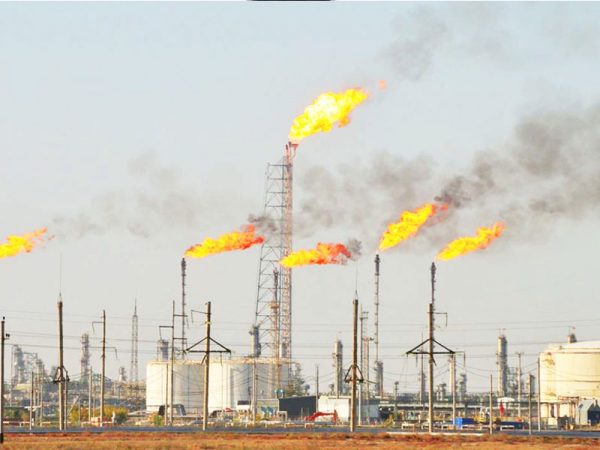Tajudeen Abbas, the Speaker of the House of Representatives, has established an Ad hoc Committee to look into the estimated $9.05 billion revenue loss from gas flaring in Nigeria over the past ten years.
At the House ad hoc committee on Gas Flaring’s Monday inauguration, Abbas gave the committee a mandate to identify the underlying factors that contribute to the problem and offer solutions.
He claimed that the investigation is a recognition of the urgent need to comprehend and lessen the effects of this behavior on the environment, society, and the economy.
“The task before this ad hoc committee is a very critical one that lies at the heart of the health of our people and economic well-being of our nation.
“You have been charged with the responsibility of investigating, perhaps, one of the most harmful practices in the oil and gas industry in Nigeria.
“Gas flaring and venting have been a significant environmental, economic, health and social concern in our country for many years.
“The flared gas represents lost revenue that could have been generated through its sale or utilisation. Official records indicate that we lose about 2.5 billion dollars annually to gas flaring,” he said.
He claimed that gas flaring, a significant cause of climate change and environmental degradation, has an effect on soil, water, and wildlife both directly and indirectly.
He believes that gas flaring constitutes a significant waste of precious resources because it is a valuable energy source that might be used for a variety of tasks, including the production of power, heating, or industrial processes.
The committee’s chairman, Rep. Babba Munir (APC-Kaduna State), earlier claimed that the members were speaking for all Nigerians.
He claimed that despite numerous efforts by oil firms to stop it, the problem of gas flaring had persisted for decades.
“We are here to give everyone a fair hearing, to know where the loopholes are, where we need to tweak our laws to ensure we get optimal results.
“We do not have to revisit how important it is to our revenue drive needed for infrastructure, security, education and health.
“It is a win-win situation for even the oil companies because if revenues are generated, it is spent on securing our nation, on infrastructure that will better their operations.
“We are insisting and putting our feet down that all agencies of government and oil companies.
“Once you are invited, we expect you to come with your full submissions and with the highest representation of your organization,” he said.
The committee requested an appearance from or on Tuesday at 10 a.m. from Total/Mobil V Domestic Wing, Total/Oando JV, Total Energies, African Petroleum Pic., now Ardova PLC.
Other companies include Nigerian Petroleum Development Company, Azman Oil and Gas Limited, Matrix Oil and Gas Shata Ltd, Nigerian Electricity Regulatory Commission, and National Council on Climate Change.
Sterling Oil Exploration & Energy, Belemaoil Producing Limited, and Yinka Folawiyo Petroleum Company (Aje Oil Field-Offshore) will also be present.
Green Energy International Limited, Millenium Oil and Gas Company Limited, Folawiyo Energy Eroton Exploration and Production Nigeria Limited, and Niger Delta Petroleum Resources Ltd. are among the companies Walter Smith Petroman Oil Limited belongs to.
According to the Nigerian Oil Spill Detection and Response Agency, gas flaring cost Nigeria N891 billion over the course of 18 months, according to NAN.
Nigeria lost a total of N891 billion in 2021 and N184 billion in the first half of 2022, according to figures from NOSDRA as of August 8, 2022.
The first half of 2022 saw a total of 126 billion standard cubic feet of gas flared by oil and gas companies operating in the nation, according to the NOSDRA study. This resulted in a loss of $441.2 million (or roughly N183.54 billion) over the course of the six-month period.
However, the government reported that in 2021 there were around 23,862.271 barrels of oil leaked (3,770,238.864 liters/119 tanker trucks).
The government provided a breakdown of the gas that was flared in the nation during the first half of 2022, noting that although businesses engaged in the offshore oilfields burned 62.2 billion SCF of gas, companies operating onshore flared 63.9 billion SCF of gas, valued at $223.6 million.
According to the research, there were two significant oil spills in 2021, with over 250 barrels of oil poured into interior waters and over 2,500 barrels spilt on land, wetlands, shorelines, and the open sea.
In total, seven medium oil leak occurrences of 25–250 barrels into inland waters or 250–2,500 barrels onto land, wetlands, shorelines, and the open sea were noted in 2021.
Up to 25 barrels of minor oil spills into interior waters or 250 barrels on land, wetlands, shorelines, and the open sea were reported in roughly 239 occasions.
(NAN)

